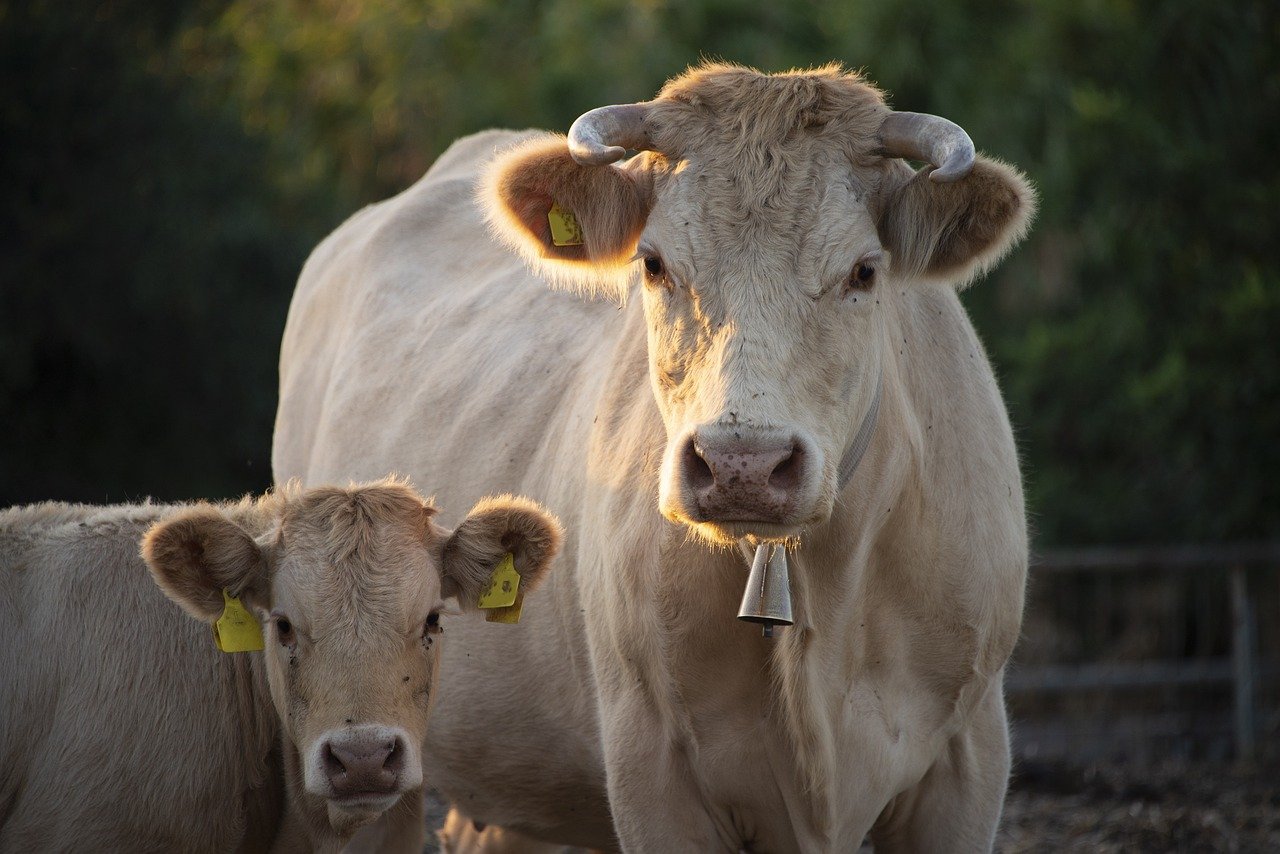“You have just dined, and however scrupulously the slaughterhouse is concealed in the graceful distance of miles, there is complicity,” wrote Ralph Waldo Emerson while musing on our ignorance of the realities of the meat industry. Saying “we did not kill the animals” or shrugging our shoulders because such is the “system” that leaves us no other choice are futile attempts to wash our hands of any guilt.
The Real Picture
Many of us know almost nothing about the horrific realities of factory farming. That we do not want to know how the sausage is made betrays a latent awareness of the horrors of factory farming. I once surprised a friend by pointing out that cows need to give birth before they can produce milk. One would think that much would be obvious. Do we wonder about the fate of the calves? And does the mother cow not want to nurse the calf? To prevent nursing, the young calf is either kept in tiny crates for a few short weeks and then slaughtered for veal, or is fitted with a spiked nose ring such that the mother starts kicking the calf each time it tries to suckle at its mother’s teat. Ingenious and cruel.
Most dairy cows are kept in feedlots and milking sheds all their lives except when they are impregnated by a machine or give birth to babies they will barely see. In her investigation of a reputed “humane” dairy farm, Annie Lowrey describes the operation: “Dairy cows are repeatedly inseminated or bred, calved, and separated from their babies. They are milked twice a day. And when their bodies begin to give out, they keep getting milked until they are euthanized or slaughtered.” 1 At the end of their lives, dairy cows too sick or lame to walk to their death are beaten, prodded, and lifted or dragged to slaughter by bulldozers. 2
Pigs are treated no better. These intelligent 500-pound mammals are confined in gestation crates 22 inches wide and 7 feet long, where they break their limbs from trying to escape. They are covered in sores, blood, tumors, pus, and their own urine and excrement. 3 In their unending misery there is no thought of their well-being except to keep them alive for a few months until they attain enough mass to be profitably slaughtered.
Factory farming is cruel by design because its sole aim is cheap meat. Unfortunately for the animals, low-cost correlates with brutal treatment. Kindness costs. It always does.
Does Cruelty to Animals Matter?
Catholics ought to include animals in their moral consideration. When asked about cruelty to animals in a 2002 interview, the future Pope Benedict XVI said, “We cannot just do whatever we want with [animals]. Animals, too, are God’s creatures… hens living so packed together that they become just caricatures of birds, this degrading of living creatures to a commodity seems to me in fact to contradict the relationship of mutuality that comes across in the Bible.” 4 We have violated God’s plan for animals by treating them with utter cruelty instead of them acknowledging them as fellow creatures in God’s creation.
Saint John Henry Newman once compared Jesus’ suffering to the suffering of innocent and defenseless animals. He suggested that because scripture compares Jesus to a lamb, we may use our horror at animal cruelty to generate anger and sadness towards Jesus crucified. 5 Further along, he reasons that we can make this comparison because Jesus and the animals have done no harm and have no power of resistance. Animals and Jesus are victims of our “cowardice and tyranny”, a situation worsened by the unnecessity of it all. In a stunning indictment of our apathy, Newman points out that “there is something so very dreadful, so satanic in tormenting those who never have harmed us, and who cannot defend themselves, who are utterly in our power, who have weapons neither of offense nor defense, that none but very hardened persons can endure the thought of it.”
Whether Jesus ate lamb or not, we cannot imagine Jesus entering a factory farm today and saying “blessed are the people who torture animals for food, they shall enjoy a juicy steak in peace.” Instead, he is the “good shepherd who lays down his life for the sheep.” (John 10:11) I believe our God of love and compassion weeps over the cruelty inflicted on His little ones. And when we solemnly pray the grace before dinner, one might wonder like Malcolm Muggeridge “how is it possible to look for God and sing his praises while insulting and degrading his creatures?”
Cooperation with Evil
We may deflect our complicity and console ourselves by blaming the “system”. “Woe to those factory farm workers and corporate executives who run these cruel operations, they have blood on their hands.” Have we wondered about the blood on our forks as we dig into steaks?
By consuming factory-farmed meat, dairy, and eggs, we are formally cooperating with evil. John Berkman, a moral theologian at Regis College in Toronto, defines formal cooperation as “when one shares the object of the wrongdoer’s activity.” 6 Berkman compares consuming factory-farmed meat to participating in dog fighting where cruelty is the essence of the enterprise. Like in dog-fighting, the cruelty to animals is inherent in factory farming. Like how one cannot claim that patronizing dog fighting is merely “attending a sporting event for leisure”, one cannot argue that eating factory-farmed meat is merely “consuming protein for nutrition”.
Just as we can entertain ourselves through cruelty-free sports, we can get protein from plant-based sources. The plethora of plant-based food in our grocery stores is a testament to the unnecessity of eating animal-based foods. Leo Tolstoy saw this more than a century back: “A man can live and be healthy without killing animals for food; therefore, if he eats meat, he participates in taking animal life merely for the sake of his appetite. And to act so is immoral.” Our appetite as the reason for killing animals is just not good enough.
Animal-based foods are so ingrained in our culture and food habits that many people cannot imagine life without them. They are a staple in the daily Western diet, are featured at sports games, and central to celebratory meals like Thanksgiving dinners and Christmas parties. All involve cruelty meat. How can so many people be misled, apathetic, or ignorant, one wonders. Intelligent and well-meaning people continue to cooperate with this evil with reckless abandon.
Nicholas Kristoff wonders likewise by drawing a comparison with slave owners. “Just as today, we wonder how people like Thomas Jefferson could have been so morally obtuse as to own and abuse slaves, our own descendants will look back at us and puzzle over how 21st-century humans could have tolerated factory farming and the systematic abuse of intelligent mammals.” While not necessarily equating the abuse of humans with the abuse of animals, Kristoff’s comparison is a salient reminder of how society can willingly ignore the suffering of multitudes.
He continues that our approach towards particular animals and a farm of animals is inconsistent: “Someone mistreats a dog and we’ll call 911. But if a company tortures millions of hogs as a business model, we dine on its products, invest in its shares, and honor its executives.” 7 Kristoff rightfully points out the faulty logic of those who claim compassion for animals but continue to promote animal cruelty by continuing to eat factory farmed meat.
“Turn from evil and do good.” – Psalm 37:27
If you are still reading at this point, you are likely aware of the cruelty of factory farming but may not know what to do about it. There is no wishing away factory farming. Instead, reflect on what motivates our consent with the evil of factory farming. To battle apathy, reflect on the reality of the suffering of animals at the hands of humans. To battle ignorance, think about what you already know and ask why you are so hesitant to dig deeper. And finally, to overcome inaction, pray about your way of life as a disciple of Christ.
Perhaps, the animals in the manger scenes at Christmas stirred your heart. Or, the new year offers a promise of a more compassionate you. Or, you feel compelled by the Gospels to treat all living creatures with God’s kindness. Whatever your reason, the animals will be grateful for including them in your circle of compassion.
—
Photo courtesy of Pixabay
- https://www.theatlantic.com/ideas/archive/2024/04/alexandre-farms-treatment-of-animals/677980/ ↩
- Matthew Scully, Fear Factories: Arguments about Innocent Creatures and Merciless People (Arezzo Books, 2023) p. 145 ↩
- Matthew Scully, Fear Factories. p. 95 ↩
- https://www.ncronline.org/news/justice/eating-and-culture-death ↩
- https://www.newmanreader.org/works/parochial/volume7/sermon10.html ↩
- John Berman, “Are We Addicted to the Suffering of Animals? Animal Cruelty and the Catholic Moral Tradition” ↩
- https://www.nytimes.com/2024/08/03/opinion/dogs-pets-animal-abuse.html ↩


